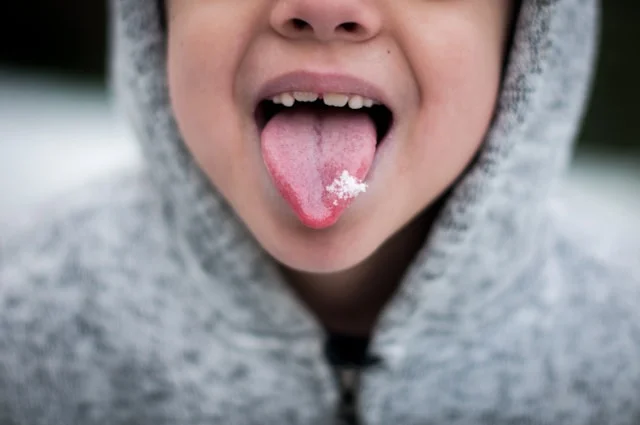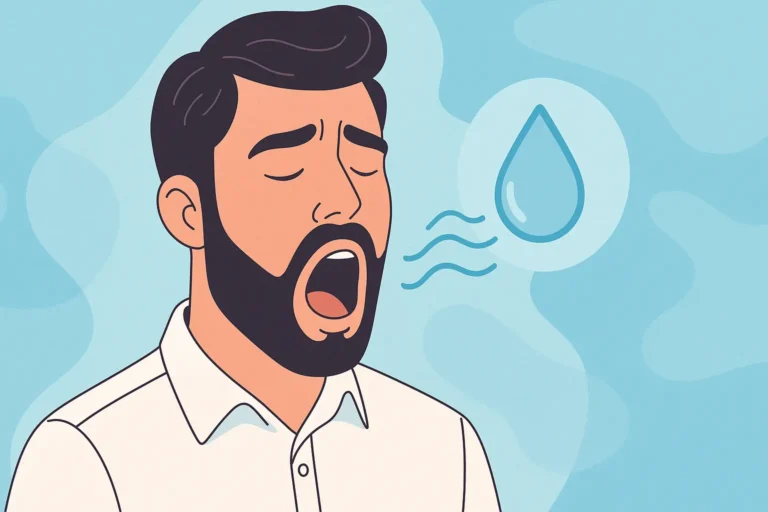Dry Mouth While Running? Here’s the Solution
If your mouth feels dry when you run, it’s usually because you’re breathing faster through your mouth, which makes saliva dry out quickly. Other factors like dehydration, certain medications, or even anxiety can make it worse.
The good news? This is common, and there are simple ways to fix it.
Why Your Mouth Gets Dry When Running
When you run, your body needs more oxygen.
That often means you breathe through your mouth instead of your nose. Mouth breathing dries out saliva faster than normal, leaving your mouth sticky or parched.
Another reason is dehydration. Even mild dehydration can reduce saliva production, so you notice that dry, uncomfortable feeling sooner.
Mouth Breathing vs. Nose Breathing
Breathing through your nose helps keep moisture in your mouth and throat. Your nose also warms and humidifies the air before it hits your lungs.
The problem? When running, especially at a faster pace, nose breathing alone might not give you enough oxygen. That’s when mouth breathing kicks in — and dry mouth becomes more likely.
Not Just Breathing — Other Causes
Sometimes dry mouth during running isn’t just from breathing.
Here are other possible reasons:
- Medications like antihistamines, blood pressure pills, or antidepressants can reduce saliva production.
- Caffeine before a run can dry you out.
- Anxiety or stress can cause “cotton mouth,” even during exercise.
- Mouthguards (if you wear one for sports) can block saliva flow.
If your dry mouth happens all the time, even when you’re not running, you might want to check with a doctor or dentist.
Dehydration Plays a Big Role
Many runners underestimate how much fluid they need.
Even if you drink water before your run, you could already be starting slightly dehydrated from coffee, alcohol, or just not drinking enough earlier in the day.
A simple check: Your urine should be pale yellow before you run. Darker? You probably need more water.
How to Prevent Dry Mouth While Running
1. Stay Hydrated Before You Start
Drink small amounts of water throughout the day, not just right before your run. A big gulp before running can make you feel bloated, but steady hydration keeps saliva flowing.
2. Use the “Sip, Don’t Gulp” Rule
Carry a small water bottle or hydration pack and sip during your run.
Drinking too much at once can lead to side stitches or stomach discomfort.
3. Try Sugar-Free Gum or Lozenges Before Running
Chewing gum or sucking on a sugar-free lozenge for a few minutes before your run can boost saliva production. Just make sure to spit it out before you pick up speed — running with gum can be a choking hazard.
4. Breathe Through Your Nose When You Can
If you’re doing an easy jog or warm-up, focus on nose breathing. Save mouth breathing for higher-intensity bursts when you really need it.
5. Avoid Drying Foods and Drinks Before Running
Salty snacks, coffee, or alcohol before a run can make dry mouth worse. Stick to water or electrolyte drinks and lighter, moist foods like fruit.
6. Use an Electrolyte Drink for Longer Runs
If you run for more than 45–60 minutes, plain water might not be enough. Electrolyte drinks help replace sodium and potassium, which can improve saliva production and keep your mouth comfortable.
What to Do If Dry Mouth Hits Mid-Run
If your mouth suddenly feels like the Sahara Desert halfway through your run:
- Take a small sip of water.
- Swish it around your mouth before swallowing to re-wet tissues.
- Slow your pace for a minute and try to breathe through your nose.
Sometimes even just rinsing your mouth with water (without swallowing) can trick your brain into feeling less thirsty.
Long-Term Fixes for Frequent Dry Mouth
If you notice dry mouth often, even outside of running, it might be a condition called xerostomia (fancy word for chronic dry mouth).
A dentist or doctor can help figure out if it’s due to medications, dehydration, or an underlying condition like diabetes or Sjögren’s syndrome.
Products That Can Help
If you want extra help beyond water and gum, here are a few runner-friendly options:
- Mouth sprays made for dry mouth (keep one in your bag).
- Xylitol-based lozenges that stimulate saliva.
- Hydration tablets you can drop into your water bottle.
These can be especially helpful if you’re running in hot, dry, or windy conditions.
When to See a Doctor
Occasional dry mouth during running is normal.
But see a healthcare provider if you also have:
- Trouble swallowing
- Constant bad breath
- Changes in taste
- Cracked lips or sores in your mouth
These could be signs of something more than just exercise-related dryness.
Final Thoughts
Dry mouth when running is usually nothing serious — just your body’s way of saying it needs more moisture.
By staying hydrated, adjusting your breathing, and making small changes to your pre-run routine, you can keep your mouth comfortable and focus on enjoying your run.







